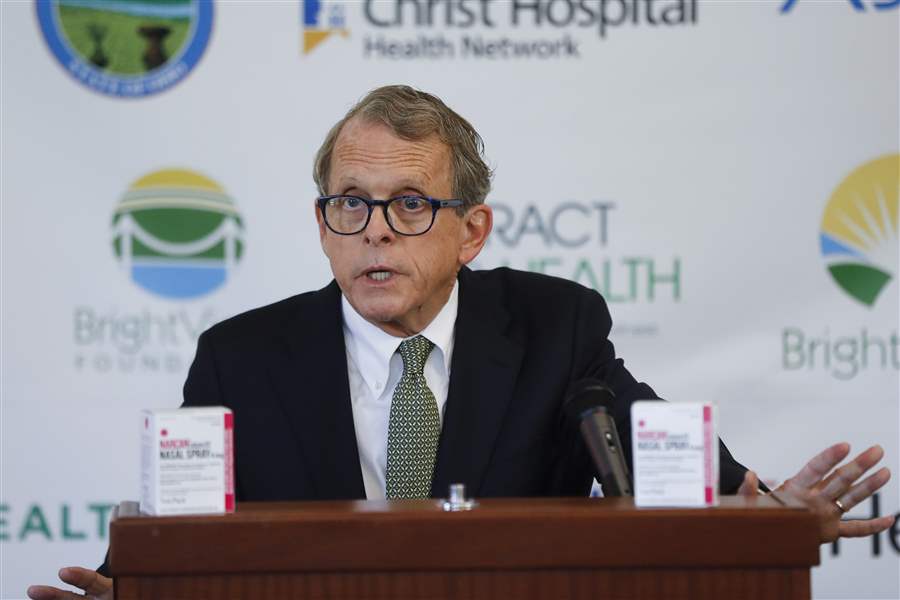
EDITORIAL
Toledo should join list of communities taking drug firms to court
9/10/2017

Ohio Attorney General Mike DeWine filed a lawsuit against five drug manufacturers in May.
ASSOCIATED PRESS
Solving the opioid epidemic in Toledo and around Ohio certainly will not be as easy as winning a courtroom victory against pharmaceutical companies. But a judgment or a settlement in such a case could go a long way toward funding the larger fight and holding those companies accountable for their part in the crisis.
Toledo Democratic mayoral candidate Wade Kapszukiewicz says the city should join Dayton, Cincinnati, Lorain, Findlay, and others that have sued large drug makers.

Ohio Attorney General Mike DeWine filed a lawsuit against five drug manufacturers in May.
Those lawsuits filed this summer blame the companies’ negligent marketing of dangerous painkillers for the current opioid epidemic that killed more than 4,000 Ohioans in 2016.
Click here to read more Blade editorials
Incumbent Democratic Mayor Paula Hicks-Hudson — who has been in office for about two and a half years as the epidemic raged on — said she did not have an opinion, but would ask the city’s legal department to study the matter.
Their Republican opponent, City Councilman Tom Waniewski, said legal fees for such a case would be better spent directly on the fight — paying for education and resources for law enforcement.
Mr. Waniewski pointed to other lawsuits, saying that Toledo would do better to spend its money on other opioid-fighting initiatives and let the state fund the legal fight against pharmaceutical companies.
In May, Ohio Attorney General Mike DeWine filed a lawsuit against five drug manufacturers. Other state attorneys general — in West Virginia and Mississippi — have filed similar lawsuits. The Mississippi case is still working its way through the courts, but in West Virginia’s case, the state has been able to get a settlement of $20 million from Ohio’s Cardinal Health.
That kind of settlement money will help West Virginia fund its fight against the epidemic, paying for treatment and enlightened enforcement.
Ohio — and Toledo — could benefit from a similar settlement.
There were 288 confirmed opioid overdose deaths across a 21-county region of northwest Ohio and southeast Michigan last year. That tops the 215 fatal opioid overdoses in the region recorded in 2015 and 145 in 2014.
Taking drug companies to court should not be taken lightly. These lawsuits will be expensive and time-consuming, and there is no guarantee of victory for the cities and states that file them.
But Toledo has a big stake in this fight and leaving it to other cities or state attorneys general is not necessarily the safe choice in this case. Having the winning court strategy or forcing a settlement from the drug makers may be a matter of getting enough plaintiffs and enough legal minds from enough cities and states to join the fight.
Moreover, a victory could mean substantial funds for Drug Abuse Response Teams, expanded drug courts, more overdose-reversing naloxone for first responders, and more treatment facilities.
Joining the list of communities taking drug companies to court is a risk and an investment, but this is a battle Toledo should seriously consider.